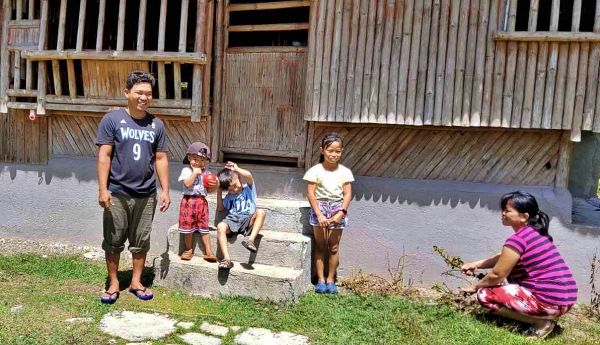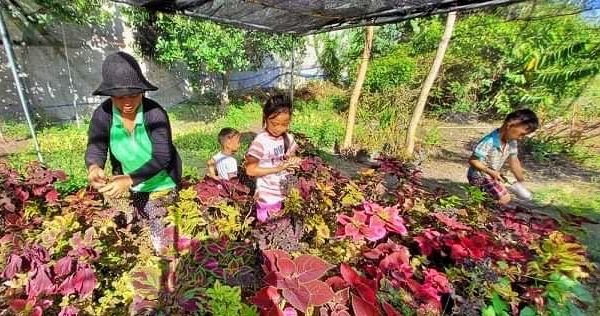The start of the Covid-19 "Enhanced Community Quarantine" in March 2020 found Joy Tañada and her husband, Tony, in their family farm in San Juan, Batangas (Philippines). They thought they would stay and rest for two weeks. But the weeks turned to months, to an entire year… up to today!
Their Batangas farm has now become home. Joy manages the farm full time. Tony, who had a heart by-pass surgery in 2017, is semi-retired and helps out in what has become a sustainable and growing farm operation.
The Tañadas' retirement story goes back to 1992. Both were then immersed in the fast-paced corporate finance setting in Metro Manila. With their savings, they purchased a piece of agricultural land not far from the city capital. Their idea was simply to have a weekend family getaway.
Busy after retirement
Joy retired from her NGO work in December 2017. She remembers asking St. Josemaria Escriva, then: “Are you going to show me what I must do next?" And she believes she heard his express reply, "Just do what is in front of you." She seconded that inspiration.
Even before her official retirement she started reading up on agriculture and farming technology. Later, she joined webinars, did research online, watched online videos, and dedicated herself to what was to be her new occupation.
Her research showed her that their property was ideal for growing lowland vegetables like kalabasa (squash), kamatis (tomatoes), talong (eggplant), pipino (cucumber), ampalaya (bitter gourd), okra, papaya, patola, pechay, and sili.
2018 was the year they started clearing the property.
The Tañadas found the farmhands right among their neighbors. Employing 7-8 workers for the planting season, plus 14 more during harvest time, jobs were created. Soon they were seriously into vegetable farming.

When operations grew, they asked their vegetable caretaker, Manny, to move into the farm with his family. He was most happy to now stay in a decent home. His wife Jenny looks after their children (ages 3, 5 and 7) and tends to the flower garden and nursery.
Creating wealth in the countryside
Rural areas in the Philippines have remained poor and the Tañadas wanted to contribute in their small way to ease the 9.67% poverty incidence in Batangas, compared to the national capital's 7.81%.
They found a strong market in the Makati business district. Companies ordered vegetables in bulk for their employees. Homeowners’ associations in Metro Manila quickly became regular customers. Their market kept growing through word-of-mouth advertising. Now, they could hardly cope with the demand.

Other farmer-led families in their town saw in the Tañadas’ operation their own possibilities for creating wealth. They too began to plant, harvest, market, trade, and earn from their lands. This was an entrepreneurial breakthrough in the area. Their town market is now assured of a steady supply of fruits and vegetables.
Challenges and growth
In September 2021, the Delta variant surge stalled operations. For the safety of the farmers and everyone else in the community, movement in and out of the farm was restricted. Deliveries to Manila were stopped.
The Tañadas saw firsthand how the families of daily wage farmers suffered from reduced income. They took the risk of paying them full wages just the same.
They explored other sources of revenue. While transportation and travel were restricted, they sold farm produce at wholesale prices to the nearby town markets. They started planting flowers and discovered that the market was good. The sales helped to cover expenses. “Our cut flowers sold well last Valentine’s day,” Joy happily shared.
Simplicity and spirituality
Farm living and management is a world of risk-taking. "Sometimes you are up against the weather or forced to contend with pests." Joy explains. One must learn to handle many unforeseen challenges, especially in pandemic times. The Tañadas discovered how supernatural the rural folk are in facing such situations.
Their strong faith in the "God who provides," amidst natural disasters like the typhoons that destroy their crops, would lead them to say, “Bahala na!” (Tagalog for "Let it be", which has its origins in "Leave it to God"). This is not an expression of resignation. Rather they are saying, “Thy will be done.” This kind of simple piety is what continues to amaze Joy and Tony.
The Tañadas found that the people are hungry for Christian doctrine and guidance. Throughout these years, they have facilitated Church marriages for couples and Baptisms for children.

Establishing contacts with people -- farmworkers, resellers, and buyers -- is what Joy finds most fulfilling in rural life. “It’s the engagement with many people that makes it possible to exchange thoughts and sentiments about family life, human values, and Christian living,” she shares.
“Retiring in a rural setting has opened our eyes to the beauty and simplicity of God in the people we meet,” says Joy.
New horizons
Samuzon Farm offers possibilities beyond growing flowers, fruits and vegetables. Joy shares that they envision the property to be “an agri-tourism hub where urban families can come to enjoy rural life and learn farming technologies.”

“Retirement is shifting gears to work on those dreams that God has planted in your heart,” says Joy.
Looking up one night from their farm, with innocent surprise, she quipped: “There are so many stars in the sky!”
Who would have thought that appreciating the stars once again after retirement would lead her and her husband to discover in rural life new marvels both divine and human?
